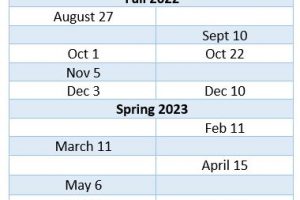Prepping for and taking high-stakes college admissions tests like the SAT and ACT can be stressful experiences. Test anxiety can impair student performance if left unchecked. Managing stress is essential for students to achieve their highest potential on these exams.
This article explores techniques to alleviate SAT and ACT anxiety and build resilience ahead of test day.
Developing a Growth Mindset
According to psychologist Carol Dweck, students with a growth mindset – the belief that abilities can be developed through effort – exhibit less test stress and more perseverance. Educators should encourage a growth mindset by:
- Praising effort and strategy over natural intelligence
- Highlighting areas of progress rather than just achievement
- Sharing stories of people who overcame challenges through practice
- Encouraging a focus on personal growth over outperforming peers
“Abilities are not fixed. With hard work, students can reach their academic goals,” says Dweck. Instilling this belief system builds resilience.
Avoiding Comparison
Seeing classmates ace practice tests or hearing others hype their scores can pressure students. To avoid unhealthy comparison:
- Evaluate progress based on personal growth versus peers
- Recognize comparisons as demotivating and intentionally shift mindset
- Focus on controlling personal effort rather than uncontrollable outcomes
- Share and celebrate achievements collectively to build community
“Comparing yourself to others derails motivation. Progress at your own pace,” counsels ACT perfect scorer Brooke Hanson. Reframing thoughts promotes resilience.
Simulating Test Conditions
The unfamiliar environment of test day causes anxiety for some students. Taking practice tests under authentic conditions minimizes surprises:
- Time yourself strictly and take tests in an unfamiliar setting
- Arrive early and get situated on practice days
- Use noise-blocking headphones to simulate a crowded room
- Mimic testing check-in procedures and banned item policies
- Follow real testing day routines for meals, clothes, wakeup time, etc.
As education scholar Adam Chick feed notes, “Adapting to the test environment ahead of time prevents it from affecting performance.” Drills boost confidence.
Trying Relaxation Techniques
Simple relaxation practices calm the mind and body:
- Deep breathing – Inhale slowly, hold breath, and exhale fully. Repeat.
- Progressive muscle relaxation – Tense and release muscle groups one by one.
- Guided visualization – Picture soothing scenes. Envision success.
- Meditation and mindfulness – Focus on the present rather than ruminating on worries.
- Positive self-talk – Replace negative thoughts with empowering affirmations.
“Relaxation strategies prevent anxiety from hijacking thinking abilities during tests,” explains counselor Dr. Bev Knox. They short-circuit stress reactions.
Getting Quality Sleep
Being well-rested improves focus, retention, and overall functioning. To optimize sleep:
- Maintain a consistent sleep routine, even on weekends
- Limit caffeine, large meals, and screen time before bed
- Do relaxing activities like reading before bedtime
- Keep a cool, dark sleeping environment
- Use white noise or meditation apps to quiet the mind
According to the American Academy of Sleep Medicine, teens need 8-10 hours of sleep nightly. “Good sleep equips students’ brains for peak performance,” says Dr. Corinne Hokayem. It pays dividends.
Eating a Smart Test Day Breakfast
Nutritious breakfasts deliver energy when students need it most. Quality options include:
- Whole grains – Oatmeal, whole wheat toast
- Protein – Eggs, peanut butter, Greek yogurt
- Fruits/veggies – Banana, berries, spinach
- Hydration – Water, milk, herbal tea
Steer clear of heavy, fatty fare that triggers drowsiness like pancakes or sausage.
“Eating a balanced breakfast helps students power through tests,” says nutritionist Emily Kyle. Refueling the body and mind boosts stamina.
Managing Time While Testing
Rushing breeds errors while working too slowly risks leaving questions blank. Effective pacing tactics include:
- Budget time wisely – Decide how long to spend per passage or question type. Stick to timelines.
- Skip and return – If stuck, flag and move on. Revisit tough questions with clear eyes.
- Use quick stress reducers – Take a few deep breaths if feeling anxious or overwhelmed. Regroup.
- Avoid checking answers until the end when racing against the clock. Going back uses precious time unless needed to avoid omitting questions.
“With practice, time management becomes second nature,” advises educator Shaan Patel. Routines prevent scrambling.
Leveraging Social Support
Surrounding students with encouragement counters isolation:
- Share preparatory challenges to normalize doubts and anxiety. Avoid bragging about high scores.
- Cheer each other’s progress rather than cutthroat competition. Community uplifts.
- Let friends and family know how to be helpful – which gestures of support mean most.
- Limit interactions with ultra-competitive peers prone to triggering comparison.
- Educate friends and family about test stress to increase empathy.
“Social support provides perspective and motivation leading up to test day,” says Stanford psychologist Dr. Denise Pope. Boosting spirits can boost scores.
Staying Positive on Test Day
On exam day, stress management is vital:
- Arrive early to get settled without pressure. Review flashcards.
- Chat with peers to relax rather than obsess last minute over material.
- Use positive self-talk like “I’ve got this!” to override doubts.
- Do quick breathing or stretching exercises during breaks to dissipate tension.
- Treat yourself afterward! Reframe tests as accomplishments, not ordeals.
“Keeping perspective prevents stress from overshadowing knowledge and skills,” says ACT prep tutor Brooke Parrish. Poise powers through challenges.
By cultivating resilience daily and having go-to stress management tools, students can take tests feeling empowered, not overwhelmed. Managing anxiety is instrumental for academic excellence.


















